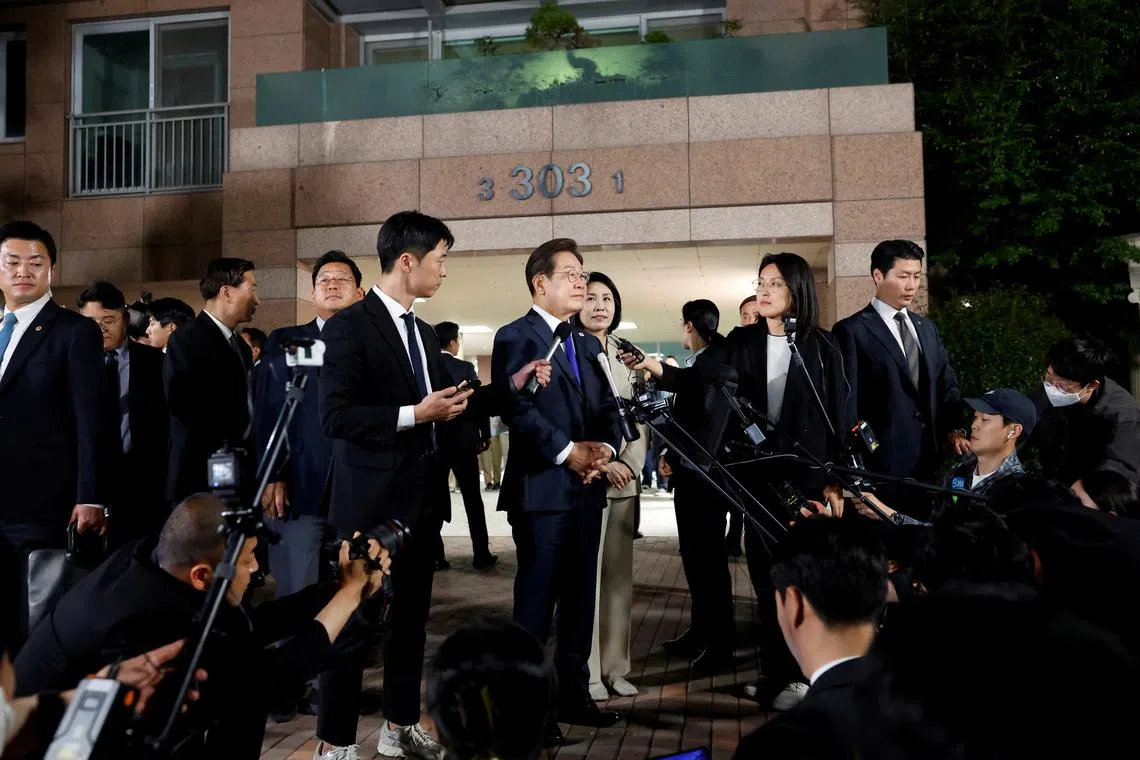South Korea’s new President Lee Jae-myung vows to revive economy
Sign up now: Get ST's newsletters delivered to your inbox

With 100 per cent of the ballots counted, Mr Lee Jae-myung won 49.42 per cent of the nearly 35 million votes cast.
PHOTO: REUTERS
Follow topic:
SEOUL - South Korea’s new liberal president, Mr Lee Jae-myung, pledged on June 4 to raise the country from the near destruction caused by a martial law attempt and revive an economy besieged by global protectionism that is threatening its very existence.
Mr Lee’s decisive victory in the June 3 snap election stands to usher in a sea change in Asia’s fourth-largest economy, after backlash against a botched attempt at military rule brought down Yoon Suk Yeol just three years into his troubled presidency.
Mr Lee faces what could be the most daunting set of challenges for a South Korean leader in nearly three decades, ranging from healing a country deeply scarred by the martial law attempt, to tackling unpredictable protectionist moves by the US, a major trading partner and security ally.
“A Lee Jae-myung government will be a pragmatic pro-market government,” he said after taking the oath of office at Parliament, a location where six months ago, he jumped over a perimeter wall to enter the Chamber and avoid troops barricading it, to vote down the martial law decree.
Mr Lee promised deregulation to spur innovation and growth in business, and pledged to reopen dialogue with North Korea while maintaining a strong security alliance with the US and bringing balance to diplomacy.
“It is better to win without fighting than to win in a fight, and peace with no need to fight is the best security,” he said on the country’s often violent ties with rival North Korea.
Mr Lee was officially confirmed earlier as president by the National Election Commission and immediately assumed the powers of the presidency and commander-in-chief, speaking with the top military leader to receive a report on defence posture.
With all the ballots counted, Mr Lee won 49.42 per cent of the nearly 35 million votes cast, while conservative rival Kim Moon-soo took 41.15 per cent, in polls that saw the highest turnout for a presidential election since 1997, official data showed.
Mr Lee has said he would address urgent economic challenges facing the country on his first day in office, with a focus on the cost-of-living concerns affecting middle- and low-income families and the struggles of small business owners.
He also faces a deadline set by the White House on negotiating import duties that Washington has blamed for a large trade imbalance between the countries.
South Korean stocks rallied on the morning of June 4, with the benchmark Kospi rising more than 2 per cent to its highest in 10 months and the financial sector leading the gain on expectations of market reform by Mr Lee.
Renewable energy stocks also rose. Mr Lee has pledged a shift to a greener energy mix.
‘Deal with Trump’
In a bid to fill a long-running power vacuum, Mr Lee nominated Mr Kim Min-seok, a four-time lawmaker, as his prime minister on June 3.
Mr Kim made waves when he predicted in August 2024 that Yoon may declare martial law, roughly three months before Yoon’s short-lived decree to impose martial law.
The government under a caretaker acting president had made little progress in trying to assuage the crushing tariffs announced by US President Donald Trump’s administration that would hit some of the country’s major industries, including automobiles and steel.
The Washington-based Centre for Strategic and International Studies said in an analysis: “President Lee will find himself with little to no time to spare before tackling the most important task of his early presidency: reaching a deal with Trump.”
US Secretary of State Marco Rubio congratulated Mr Lee on his election win and said the countries “share an ironclad commitment to the Alliance grounded in our Mutual Defence Treaty, shared values and deep economic ties”.
He also said the countries were “modernising the Alliance to meet the demands of today’s strategic environment and address new economic challenges”.
The White House said the election of Mr Lee was “free and fair”,
Mr Lee has expressed more conciliatory plans for ties with China and North Korea, in particular, singling out the importance of China as a major trading partner while indicating reluctance to take a firm stance on security tensions in the Taiwan Strait.
Still, he has pledged to continue Yoon’s engagement with Japan and said the alliance with the US is the backbone of South Korea’s global diplomacy. REUTERS

